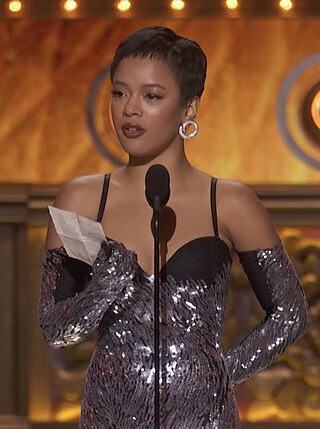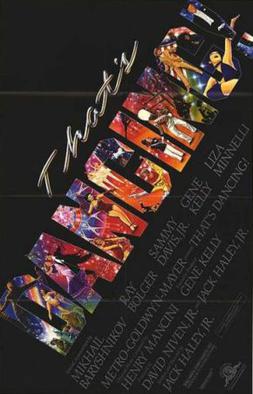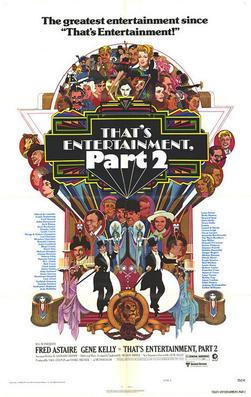
Ethel Waters was an American singer and actress. Waters frequently performed jazz, swing, and pop music on the Broadway stage and in concerts. She began her career in the 1920s singing blues. Her notable recordings include "Dinah", "Stormy Weather", "Taking a Chance on Love", "Heat Wave", "Supper Time", "Am I Blue?", "Cabin in the Sky", "I'm Coming Virginia", and her version of "His Eye Is on the Sparrow". Waters was the second African American to be nominated for an Academy Award, the first African American to star on her own television show, and the first African-American woman to be nominated for a Primetime Emmy Award.

Eleanor Torrey Powell was an American dancer and actress. Best remembered for her tap dance numbers in musical films in the 1930s and 1940s, she was one of Metro-Goldwyn-Mayer's top dancing stars during the Golden Age of Hollywood. Powell appeared in vaudeville, on Broadway, and most prominently, in a series of movie musical vehicles tailored especially to showcase her dance talents, including Born to Dance (1936), Broadway Melody of 1938 (1937), Rosalie (1937), and Broadway Melody of 1940 (1940). She retired from films in the mid-1940s but resurfaced for the occasional specialty dance scene in films such as Thousands Cheer. In the 1950s she hosted a Christian children's TV show and eventually headlined a successful nightclub act in Las Vegas. She died from cancer at 69. Powell is known as one of the most versatile and athletic female dancers of the Hollywood studio era.

Vincente Minnelli was an American stage director and film director. For a career spanning over half a century, he is best known for his sophisticated innovation and artistry in musical films. As of 2024, six of his films have been selected for preservation in the United States National Film Registry.

The Tony Award for Best Performance by a Leading Actress in a Musical is an honor presented at the Tony Awards, a ceremony established in 1947 as the Antoinette Perry Awards for Excellence in Theatre, to actresses for quality leading roles in a musical play, whether a new production or a revival. The awards are named after Antoinette Perry, an American actress who died in 1946.

William Reginald Gardiner was an English actor on the stage, in films and on television.

Beatrice Gladys Lillie, Lady Peel, known as Bea Lillie, was a Canadian-born British actress, singer and comedic performer.

Arthur Schwartz was an American composer and film producer, widely noted for his songwriting collaborations with Howard Dietz.

Howard Dietz was an American publicist, lyricist, and librettist, best remembered for his songwriting collaboration with Arthur Schwartz.

That's Entertainment! is a 1974 American compilation film released by Metro-Goldwyn-Mayer to celebrate the studio's 50th anniversary. The success of the retrospective prompted a 1976 sequel, the related 1985 film That's Dancing!, and a third installment in 1994.

That's Dancing! is a 1985 American compilation film produced by Metro-Goldwyn-Mayer that looked back at the history of dancing in film. Unlike the That's Entertainment! series, this film not only focuses specifically on MGM films, but also included films from other studios.

John Howard Payne was an American film actor who is mainly remembered from film noir crime stories and 20th Century Fox musical films, and for his leading roles in Miracle on 34th Street and the NBC Western television series The Restless Gun.

The Geisha, a story of a tea house is an Edwardian musical comedy in two acts. The score was composed by Sidney Jones to a libretto by Owen Hall, with lyrics by Harry Greenbank. Additional songs were written by Lionel Monckton and James Philp.

George White's Scandals were a long-running string of Broadway revues produced by George White that ran from 1919–1939, modeled after the Ziegfeld Follies. The "Scandals" launched the careers of many entertainers, including W. C. Fields, the Three Stooges, Ray Bolger, Helen Morgan, Ethel Merman, Ann Miller, Eleanor Powell, Bert Lahr and Rudy Vallée. Louise Brooks, Dolores Costello, Barbara Pepper, and Alice Faye got their show business start as lavishly dressed chorus girls strutting to the "Scandal Walk". Much of George Gershwin's early work appeared in the 1920–24 editions of Scandals. The Black Bottom, danced by Ziegfeld Follies star Ann Pennington and Tom Patricola, touched off a national dance craze.

That's Entertainment, Part II is a 1976 American compilation film released by Metro-Goldwyn-Mayer and a sequel to That's Entertainment! (1974). Like the previous film, That's Entertainment, Part II was a retrospective of famous films released by MGM from the 1930s to the 1950s. Some posters for the film use Part 2 rather than Part II in the title.
Harry Akst was an American songwriter, who started out his career as a pianist in vaudeville accompanying singers such as Nora Bayes, Frank Fay and Al Jolson.

Born to Dance is a 1936 American musical film directed by Roy Del Ruth and starring Eleanor Powell, James Stewart and Virginia Bruce. It was produced and distributed by Metro-Goldwyn-Mayer. The score was composed by Cole Porter.

I Dood It is a 1943 American musical comedy film starring Red Skelton and Eleanor Powell, directed by Vincente Minnelli, and released by Metro-Goldwyn-Mayer. The screenplay is by Fred Saidy and Sig Herzig and the film features Richard Ainley, Patricia Dane, Lena Horne, and Hazel Scott. John Hodiak plays a villain in this production, just his third movie role. Jimmy Dorsey and his Orchestra provide musical interludes.

Raymond Knight was an American actor, comedian and comedy writer, best known as a pioneer in satirical humor for network radio.
Inside U.S.A. is a musical revue by Arthur Schwartz (music) and Howard Dietz (lyrics). It was loosely based on the book Inside U.S.A. by John Gunther. Sketches were written by Arnold M. Auerbach, Moss Hart, and Arnold B. Horwitt.

Jeni LeGon, also credited as Jeni Le Gon, was an American dancer, dance instructor, and actress. She was one of the first African-American women to establish a solo career in tap dance.


















